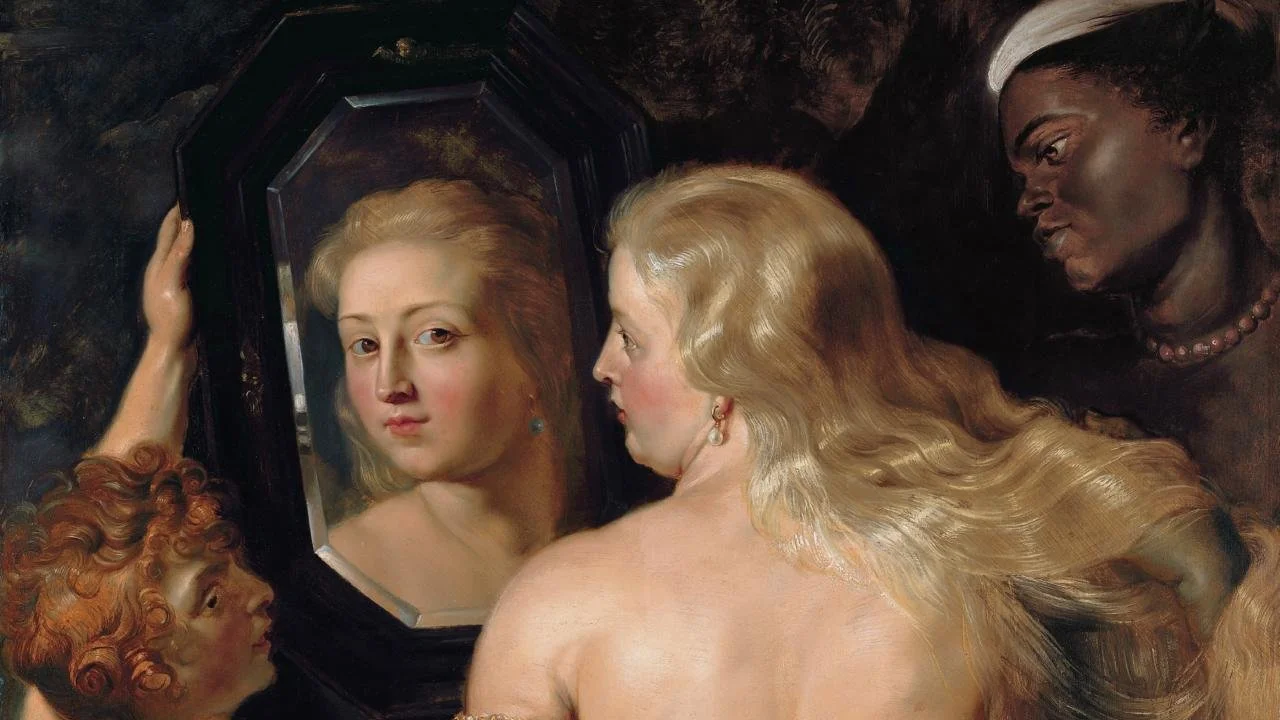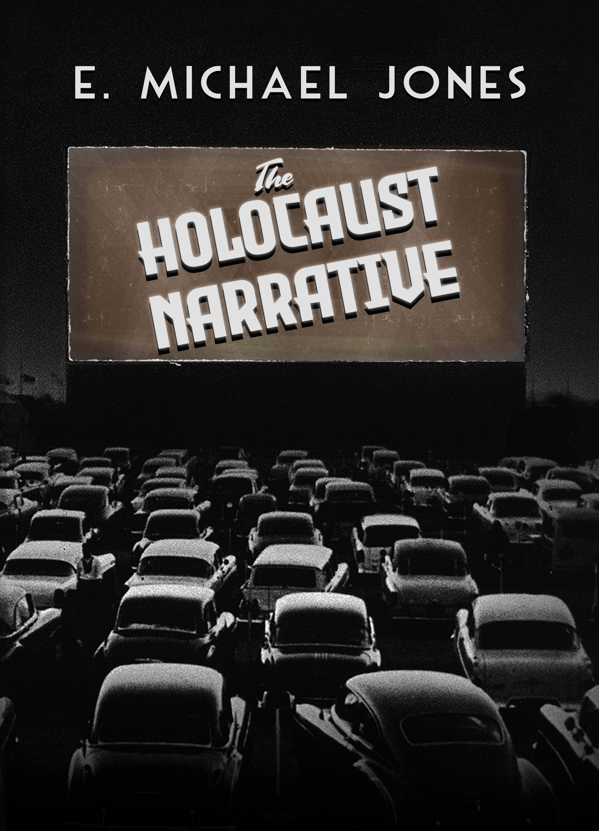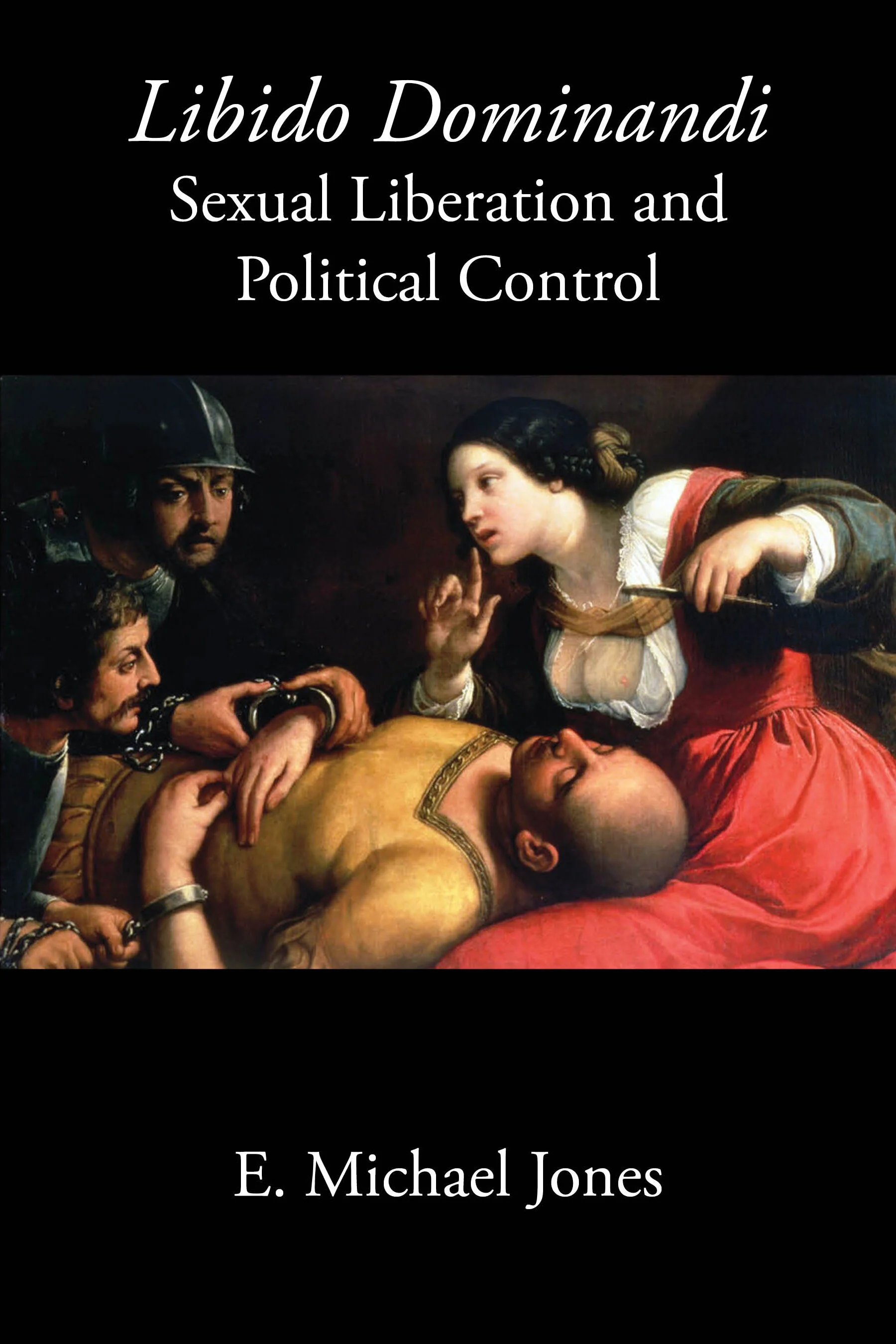Satanism as the Hidden Grammar of America
/La défaite de l’Occident by Emmanuel Todd Reviewed by Dr. E. Michael Jones
In La défaite de l’Occident, Emmanuel Todd claims that the collapse of the American empire was caused by the evaporation of Protestantism, which he describes as its hidden grammar.
America is now facing defeat in the Ukraine because of the complete disappearance of the Christian foundation of its culture, “un phénomène historique crucial qui, justement, explique la pulvérisation des classes dirigeantes américaines.”[1] Protestantism, which “to a large extent, has been the economic strength of the West, is dead.”[2] Both the United States and England have been caught up in a “centripetal, narcissistic then nihilistic drift,” which has led both the present empire and its predecessor to something which Todd calls the “Zero State,” which he defines as a nation state which is “no longer structured by its original values,” which in this instance means that the Protestant work ethic and the feeling of responsibility which previously animated its population has evaporated.[3] Both Trump and Biden epitomize the apotheosis of the Zero State because Washington’s decisions under both administrations have ceased to be moral or rational.
The Zero State was preceded by the Zombie State, which retains the form but is emptied of its content. Todd sees Benjamin Franklin as a typical Zombie Protestant, who no longer practices his religion but retains its ethics, attached to the values of honesty, work, seriousness, and always aware that man only has a limited amount of time.[4] Zombie Protestant society emerged in Europe when Germany and Great Britain created a world:
in which religious practice withers but where the social values of religion persist, as well as the rites of passage prescribed by the various Churches. Neither baptism, nor marriage, nor burial are called into question. But, as a sign that the West no longer respects the biblical commandment to “grow and multiply,” – fertility is falling in the middle classes. Deprived of its supervision, the Protestant work ethic in Britain devolved into pure nationalism.[5] Literacy is a fundamental Protestant value because sola scriptura requires the masses to be literate in order to have access to the Scriptures, which makes every man his own priest, thus promoting democracy and egalitarianism.
Todd derives his understanding of Protestantism from Max Weber’s famous book The Protestant Ethic and the Spirit of Capitalism. In his attempt to answer the question “Qu’est-ce quel’Occident?” Todd identifies himself specifically as a pupil of Weber. Todd is “en bon élève de Max Weber, qui plaça la religion de Luther et de Calvin à la source de ce qui apparaissait à son époque comme la supériorité de l’Occident.”[6]
The best exposition of the Weber thesis in the English-speaking world is R. H. Tawney’s Religion and the Rise of Capitalism. Tawney writes: “Weber, in a celebrated essay, expounded the thesis that Calvinism in its English version was the parent of capitalism.” According to Weber, “religious radicalism . . . went hand in hand with an economic radicalism.”[7] One of the first critiques of Weber’s thesis, however, noticed the connection between the Puritans and the Jews. In his 1907 book Jews and Modern Capitalism, Werner Sombart points out that everything Weber said about Puritans was a fortiori true of Jews. If Sombart’s earlier book on capitalism caused Weber to write his articles on the Puritan spirit, those articles led Sombart to write his book on the Jews. “In fact,” Sombart writes, “Max Weber’s researches are responsible for this book. I have already mentioned that Max Weber’s study of the importance of Puritanism for the capitalistic system was the impetus that sent me to consider the importance of the Jew, especially as I felt that the dominating ideas of Puritanism which were so powerful in capitalism were more perfectly developed in Judaism and were also of a much earlier date.”[8] Having read Weber’s thesis, Sombart wonders:
whether all that Weber ascribes to Puritanism might not with equal justice be referred to Judaism, and probably in a greater degree; nay, it might well be suggested that that which is called Puritanism is really Judaism.[9]
According to Sombart, Puritanism is nothing more than an aberrant form of Judaism because both are based on:
the preponderance of religion interests, the idea of divine rewards and punishments, asceticism within the world, the close relationship between religion and business, the arithmetical conception of sin, and, above all, the rationalization of life.[10]
Sombart was hardly the first one to notice the connection. He cites Heinrich Heine who asked: “Are not the Protestant Scots Hebrews, with their Biblical names, their Jerusalem, their pharisaical cant? And is not their religion a Judaism which allows you to eat pork?”[11] Or as one Calvinist put it: “If I am to say on my honour why I am become a Calvinist, I shall have to confess that the one and only reason which persuaded me was that among all the religions, I could find nothing which agreed so much with Judaism and its view of life and faith.”[12]
Emmanuel Todd
Writing 60 years before Sombart attempted to correct the Weber Thesis by claiming that capitalism was Jewish, Karl Marx wrote in Zur Judenfrage that the worldly cult of the Jew was huckstering and his worldly god, money, and that the most Jewish country on the face of the earth was New England because of the Puritans who settled there:
the devout and politically free inhabitant of New England is a kind of Laocoon who makes not the least effort to escape from the serpents which are crushing him. Mammon is his idol, which he adores not only with his lips but with the whole force of his body and mind. In his view the world is no more than a Stock Exchange, and he is convinced that he has no other destiny here below than to become richer than his neighbour. Trade has seized upon all his thoughts, and he has no other recreation than to exchange objects. When he travels, he carries, so to speak, his goods and his counter on his back and talks only of interest and profit.[13]
Marx too emphasizes the practical sphere of life, specifically commerce, as the area in which Jewish values have most influenced their nominally Christian imitators and admirers, the Puritans. Money, not theology, is the true ecumenical lingua franca:
Money is the jealous god of Israel, beside which no other god may exist. Money abases all the gods of mankind and changes them into commodities. Money is the universal and self-sufficient value of all things. It has, therefore, deprived the whole world, both the human world and nature, of their own proper value. Money is the alienated essence of man’s work and existence; this essence dominates him and he worships it. . . . The god of the Jews has been secularized and has become the god of this world. The bill of exchange is the real god of the Jew. His god is only an illusory bill of exchange.[14]
As Tawney showed malgré lui, there is no difference on the theoretical level between the Puritan Divine and the Catholic Schoolman when it comes to the relationship between morality and economics. On the practical level, however, the opposite was true. If we ask what the Jew and the Puritan have in common on the practical level, the answer is capitalism, not theology.
Marx, like William Cobbett, whom he admired, felt that capitalism began with the looting of the Catholic monasteries. In breaking with Catholicism, English Christianity became Jewish because by benefiting financially from the looting of the monasteries, the Anglican Church accepted Mammon as its god. This is what Marx meant when he said that the Christianity which “issued from Judaism . . . has now been re-absorbed into Judaism.”[15] The same Christianity which Marx characterized as “the sublime thought of Judaism”[16] became Judaism, which is to say, the worship of Mammon, once its raison d’être became the rationalization of looting. The moment in which English Christianity got absorbed back into Judaism is known as the Reformation. Capitalism is the worship of Mammon.
At the beginning of the Christian era, the Christian was a “theorizing Jew.” He achieved this state by choosing the quest for heaven over the quest for money. Any Christian, on the other hand, who asserts the hegemony of mammon over morals, becomes a “practical Christian,” which is another word for a Jew. Or as Marx puts it: “The Jew is the practical Christian. And the practical Christian has become a Jew again.”[17] As soon as he subordinated morals to economic considerations, which is to say as soon as he began to worship Mammon, the true god of the Jews, the Christian became a Capitalist, which is to say, a Jew, and Christianity became a form of Judaism, henceforth known as Calvinism or the Geist of Protestantism. Framed in these terms, Marx’s formulation explains the hidden grammar of both sides of the English Civil War: the Anglicans (who benefited from the looting when they became the state Church and the owners of stolen property) as well as the Puritans, who became envious of their ill-gotten wealth and hijacked it 100 years later. The common ground which both came to share in the wake of the Glorious Revolution, when Roundhead and Cavalier joined together for the first time as “Protestants,” was capitalism, which is the worship of the Jewish god, money.
Sombart’s reading of Weber sounds like a continuation of Marx’s treatise on the Jews. According to both men, the Geist of capitalism is Jewish. “The Jewish outlook,” according to Sombart, is “modern.” All these activities are summed up in the word “capitalism.”[18] Sombart substantiates Heinrich Pesch’s claim that modern capitalism is state sponsored usury when he claims that money-lending, the quintessential Jewish occupation, “contains the root idea of capitalism.”[19] Like Marx, Sombart felt that “the Jewish religion has the same leading ideas as Capitalism.”[20] “Rationalism is the characteristic trait of Judaism as of Capitalism.”[21] Capitalism, like the usury upon which it is based, is, as Sombart puts it, “contrary to . . . Nature.” Before capitalism could develop, “the natural man had to be changed out of all recognition, and a rationalistically minded mechanism introduced in his stead.”[22]
The rise of capitalism in Christian Europe meant that the businessman would become more and more “Jewish” in his dealings with fellow Christians. The pious Jew was forbidden to take interest on money lent to fellow Jews, but he was “not oppressed by the burden of the anti-usury prohibition which weighed upon the Christian” when it came to lending to non-Jews. Before long the permission turned to a form of encouragement, that quickly degenerated into a Talmudic culture of cheating in which the Jew was praised for his usurious dealings with Christians. The Jew “took delight in cheating and overreaching.”[23]
As this attitude spread among Christian businessmen and combined with the undeniable fact that the looters in England belonged to the aristocracy, class conflict began to emerge among the English. Jewish concepts like the “goyim,” were applied to the those who were not part of the Calvinist Elect. In the aftermath of the Glorious Revolution, when, as Marx put it, “Locke supplanted Habakkuk,”[24] economics supplanted theology, and the reprobate “goyim” were redefined as the proletariat or the lower orders. According to John Locke and Adam Smith, labor was the source of all value. Capitalism was created by the Whig oligarchs who created the Bank of England as their way of appropriating surplus value via usury, and the laboring classes who were the source of all value became via this same alchemy, the goyim, which means, in short the people whom it was permitted to cheat. By the time Marx arrived in England, class conflict was an inextricable part of the capitalist system.
Similarly, the concept of the just price was not unknown among Jews, but it only applied to fellow Jews. In the Jews’ relations with the goyim the price became whatever the Jew could extort. This distinction would have far-reaching consequences. As Sombart points out, over the course of the centuries Jewish standards of commerce became more and more the norm throughout Europe. Christian merchants began acting more and more like Jews, and gradually those methods began to supplant the commercial dealings that were based on Catholic moral theology. With the rise of capitalism, the Christian who aspired to treat every man as his brother in Christ was more and more supplanted by the capitalist who treated the customer in the same way that the Jew treated the goyim in his business dealings with him. The Christians who were most likely to succeed in commerce became those most willing to act like Jews, as the success of the Lombards as pawnbrokers in Brugge proved.
Like Yuri Slezkine, Sombart felt that “the Jewish outlook was the ‘modern’ outlook.” As a result “the Jews have been champions of the cause of individual liberty. They resisted regulation, supported free trade, free competition, and advanced economic rationalism…. The Jewish religion and capitalism contain the same spirit. Both are alien artificial elements in the midst of a natural, created world. Both are creations of the intellect.”[25]
Unlike Weber’s theory of the origin of capitalism, Sombart’s thesis actually corresponds to the historical progress of capitalism because that “economic activity follows the wanderings of Jews as they passed from the nations of southern to those of northwest Europe. Holland, England, and France became significant economic actors from the first appearance of the Spanish Jewish emigres in those countries.”[26] According to Sombart the capitalist ball began rolling with the expulsion of the Jews from Spain:
One of the most important facts in the growth of modern economic life is the removal of the center of economic activity from the nations of Southern Europe—the Italians, Spaniards and Portuguese, with whom must also be reckoned some South German lands—to those of the Northwest—the Dutch, the French, the English and the North Germans. The epoch-making event in the process was Holland’s sudden rise to prosperity, and this was the impetus for the development of the economic possibilities of France and England.[27]
Many Jews from the Iberian peninsula ended up in the Spanish Netherlands, and as a result Antwerp became the most significant entrepot linking the Atlantic trade in gold and silver, the Spice trade from the East Indies, the Mediterranean trade from the South and the Hanseatic cities of the Baltic. Given Antwerp’s link to all of these markets as well as to the river trade in Germany, commerce took a quantum leap forward, and, given the role that Jews recently expelled from Spain (in collaboration with English Protestants and Dutch Calvinists) played in defining how that commerce would be conducted, it is not surprising that capitalism would become ipso facto inimical to Catholic interests and the moral law as well.
Sombart, like Marx before him, felt that the United States was destined to become the pre-eminent capitalist country because of the circumstances surrounding its colonization and birth as a nation. Foremost among them was “Jewish access to newly discovered gold and silver in the countries of Central and South America,” which “facilitated their role in international trade in luxury goods.” As a result, “the United States are filled to the brim with the Jewish spirit.”[28]
After deconstructing Weber’s claim, Sombart proposes his own myth concerning the origin of capitalism. Modern Europe was created by a confluence of two groups: Germans rooted in the soil, and Jews who were wandering herdsmen. According to Sombart:
The capitalistic civilization of our age is the fruit of the union between the Jews, a Southern people pushing into the North, and the Northern tribes, indigenous there. The Jews contributed an extraordinary capacity for commerce, and the Northern peoples, above all the Germans, an equally remarkable ability for technical inventions.[29]
The main premise upon which the German half of Sombart’s origins thesis rests is the claim that “From the very first [our ancestors, i.e., the Germans] . . . seemed to be rooted in the soil.”[30] This means that Germans, who live in cool forests, are closer to nature (“Man is brought into closer touch with Nature in the North than in the hot countries.”) than the Jews, who “have received their peculiar impress from the thousands of years of wandering in the wilderness.”[31] The German genius, in other words, brought forth the “feudal manorial system,” a system tied to the soil:
from the soil which the ploughshare turns up arose that economic organization of society which was dominant in Europe before Capitalism came—the feudal, manorial system, resting on the ideas that production should be only for consumption, that every man should have a niche to work in and that every society should have differences in status. The peasant’s holding, strictly marked off as it was from his neighbor’s, gave prominence to the idea of each man’s limited sphere of activities, of “the estate to which it had pleased God to call him” there he was to remain and work in the traditional way.[32]
This system finds its antithesis in Jewish Capitalism: “From the endless wastes of sand, from the pastoral pursuits, springs the opposite way of life—Capitalism.”[33] According to Sombart:
Their constant concern with money distracted the attention of the Jews from a qualitative, natural view of life to a quantitative abstract conception. The Jews fathomed all the secrets that lay hid in money and found out its magic powers. They became the lords of money, and, through it, lords of the world.[34]
As with Max Weber, whose book he criticizes, Werner Sombart runs into trouble when he tries to formulate a theory which can explain the origins of capitalism. To begin with, the German half of Sombart’s foundational myth flies in the face of historical reality. The Germans were not bound to the soil, certainly not “from the very first” as Sombart claims. In fact, the rise of German hegemony over European culture, as symbolized by the Holy Roman Empire, began with the exact opposite of attachment to the soil. It began with something the Germans term the “Voelkerwanderung,” i.e., with the wandering of the German tribes beginning in earnest around the Fourth Century AD. When the Goths settled on the southern bank of the Danube and defeated the Roman legions in the battle of Adrianople in 378, the stage was set for centuries of looting and pillaging as these barbaric and largely Germanic hordes swept over what was left of the Roman empire and remade Europe in their image.
The Lombards (or Langobards) are a typical example of one of the wandering Germanic tribes who changed the face of Europe after the fall of Rome by looting and plundering. After subduing the local population, the Lombards exacted tribute so that they could engage in things they considered important, namely, hunting, warring, and raising pigs. The Germanic invasion would have significant consequences for the economic development of Italy, and once northern Italy became Europe’s premier power in banking and finance, their development would have significant consequences for all of Europe, and once Europe founded its colonies in the New World, consequences for the entire world as well.
The Lombard conquest of Italy began when the entire Lombard nation (200,000 strong) was driven out of their most recent home in Pannonia on the Danube by the Mongols. Following the route already established by the Roman legions, the Lombards crossed the Julian Alps into Italy in 568 “and soon overran Venetia and the valley of the Po as far west as Milan.”[35]
In the aftermath of the invasion, the conquered “Romans” had two choices. They could remain on the land, in which case they became slaves of the Lombards. This peasant class supplied the material needs of the Lombard elites because “The main activity of most free Lombards was warfare and hunting; their land they left to be worked by the dependent population.”[36] A new Germanic aristocratic culture replaced its Roman predecessor, and “Their principal activity was hunting and the breeding of swine and other animals most easily adapted to forest life.”[37]
By the middle of the seventh century, the Lombards controlled a land area four-times larger than Byzantine Italy, but “the Lombards . . . were practically cut off from all maritime activity and even neglected to use their two ports of Genoa and Pisa.”[38] The “Greeks,” on the other hand, controlled all of the coastal districts, all of the ports, and therefore all of the commerce of what was the former Roman Empire in the West. Commerce continued in Italy during the “dark ages,” largely because of the ports of Byzantine Italy, all of which “maintained perpetual contacts with Constantinople and the eastern Mediterranean, which at that time were economically the most vigorous and enterprising part of the world.”[39]
Those who chose not to serve the new Germanic masters left the land and took up residence in the complex of islands that made up the delta of the Po and Adige Rivers, which came to be known as Venice. Venice retained its identity as an outpost of the Roman empire largely through its navy, which facilitated trade with Constantinople, the capital of the Eastern Empire which remained untouched by Germanic invasions. Culture in Italy, as a result, took on a dual Germanic-Greco-Roman character. Tilling the soil according to the system of the feudal, manorial economy characterized the Germanic, Langobardian interior of Italy, while commerce with the Greeks, which engendered a money economy, characterized the cities along the coast. Eventually, during the course of the Middle Ages, these two Italys, along with their different economic systems, would come in conflict with each other, and it would be up to the Catholic Church to adjudicate their differences and decide which economic advances were compatible with a Christian social order and which were not.
The final element which contributed to the development of economic life in post-Imperial Christian Italy was the Catholic Church, in particular the large ecclesiastical estates which were first managed in a systematic way by the monastic orders: “The man most responsible for this was St. Benedict (480-543) who in his famous Rule, compiled about 534 for the abbey on Monte Cassino, provided a model for the economic practice of all the Benedictine houses subsequently founded throughout Italy and western Europe.”[40] Gradually under the influence of Benedictine monks, who in addition to the traditional vows of chastity, poverty, and obedience, took a vow of stability binding them to one place, animal husbandry and agriculture took the place of the hunting and looting, which had been the basis of aristocratic Langobardic culture.
Sombart got it wrong when he ascribed to the Germans some mystical connection to the soil. The Germanic connection to the soil came not from the culture of wandering German tribes but from the Catholic Church in general and the vow of stability taken by Benedictine monks in particular, as they tried for 1,000 years to civilize and Christianize the Germanic barbarian looters who constituted the ruling class in Europe.
Economic development in Italy took place in a cultural matrix composed of these three competing forces. Gradually, the forests and swamps of the Po Valley, where the Lombards did their hunting, were cleared and drained under the tutelage of the Benedictines, and the surplus food which this land produced helped feed the commerce-oriented population of cities like Venice, Florence and Milan, which could then engage in increasingly far-flung and sophisticated trading with Byzantium and the Levant on the one hand and Flanders and England on the other. This increasingly lucrative trade, especially after the added impetus of the Crusades, led, in turn, to increased economic development, which led to the need for increasingly sophisticated financial instruments to keep track of and facilitate even more complex forms of commerce. As increased economic activity led to increased wealth and increased wealth to increased power, conflicts arose between the stable feudal culture of the land and the money culture of commerce that was slowly replacing it as centers of northern Italian commerce like Florence, Lucca, Siena and Milan rose to prominence alongside Venice. “In the Middle Ages it was the international trade ventures that did most to favor the rise of the capitalist spirit.”[41]…
[…] This is just an excerpt from the April 2024 Issue of Culture Wars magazine. To read the full article, please purchase a digital download of the magazine, or become a subscriber!
Articles:
Culture of Death Watch
Not that Innocent: Who are the Real
Villains in the Life of Britney Spears? by Eric Brandt
Saul Alinsky’s Chicago by Jack Kopreus
Features
The Ethnic Cleansing of German Minorities after the War by Dr. E. Michael Jones
Reviews
Satanism as the Hidden Grammar of America by Sean Naughton
(Endnotes Available by Request)
[1] Todd, p. 30. a crucial historical phenomenon which, precisely, explains the dispersal of the American ruling classes.
[2] Todd, p. 30.
[3] Todd, Emmanuel, The Defeat of the West p. 337
[4] Todd, p. 214. un protestant zombie typique, qui ne pratique plus sa religion mais en conserve l’éthique, attaché aux valeurs d’honnêteté, de travail, de sérieux, et toujours conscient que l’homme ne dispose que d’un temps limité.
[5] Todd, p. 216.
[6] Todd, p. 139. a good student of Max Weber, who placed the religion of Luther and Calvin at the source of what appeared in his time as the superiority of the West.
[7] R. H. Tawney, Religion and the Rise of Capitalism: a Historical Study (Holland Memorial Lectures, 1922) (Gloucester, Mass: Peter Smith, 1962), p. 232.
[8] Werner Sombart, The Jews and Modern Capitalism (New Brunswick, NJ: Transaction Books, 1982), p. 248.
[9] Sombart, p. 192.
[10] Ibid.
[11] Ibid.
[12] Sombart, p. 251.
[13] Karl Marx, “On the Jewish Question,” in The Marx-Engels Reader, ed. Robert C. Tucker (New York: W. W. Norton & Company, 1978), p. 49.
[14] The Marx-Engels Reader, p. 50.
[15] The Marx-Engels Reader, p. 55.
[16] Ibid.
[17] Ibid.
[18] Sombart, p. 153.
[19] Sombart, p. 189.
[20] Sombart, p. 205.
[21] Sombart, p. 206.
[22] Sombart, p. 238.
[23] Sombart, p. 246.
[24] The Marx-Engels Reader, p. 596.
[25] Sombart, p. xxiii.
[26] Sombart, p. xx.
[27] Sombart, p. 11.
[28] Sombart, p. xx.
[29] Sombart, p. 323.
[30] Sombart, p. 336.
[31] Sombart, p. 337.
[32] Sombart, p. 343.
[33] Ibid.
[34] Sombart, p. 344.
[35] Gino Luzzatto, An Economic History of Italy from the Fall of the Roman Empire to the beginning of the 16th century (New York: Barnes & Noble, 1961), p. 18.
[36] Luzzato, p. 24.
[37] Luzzato, p. 18.
[38] Luzzato, p. 20.
[39] Ibid.
[40] Luzzato, p. 21.
[41] Fanfani, p. 135.
[42] Ibid.
[43] Fanfani, p. 94.
[44] Todd, p. 141.
[45] R. H. Tawney, Religion and the Rise of Capitalism
[46] https://diginole.lib.fsu.edu/islandora/object/fsu:204641
[47] Herman Melville, Moby Dick, chapter 38.
[48] Troilus and Cressida, Act 1, Scene 3, Folger Shakespeare Library, https://www.folger.edu/explore/shakespeares-works/troilus-and-cressida/read/1/3/
[49] Todd, p. 33. un amoralisme découlant d’une absence de valeurs.
[50] Todd, Emmanuel, The Defeat of the West p. 346
[51] Todd, p. 334.
[52] Todd, p. 334.
[53] Todd, p. 30.
[54] Todd, p. 31.
[55] John William Fletcher, American patriotism farther confronted with reason, Scripture, and the constitution: observations on the dangerous politicks taught by mr. Evans, and dr. ... a Scriptural plea for the revolted colonies Kindle edition. Loc 1754.
[56] Fletcher, Location 1836
[57] “United States Declaration of Independence,” Wikipedia: The Free Encyclopedia, https://en.wikipedia.org/wiki/United_States_Declaration_of_Independence
[58] Todd, p. 39.
[59] Todd, p. 46.
[60] Todd, p. 59.
[61] Emmanuel Todd, La Défaite de l’Occident, Kindle edition. https://www.amazon.com/D%C3%A9faite-lOccident-French-Emmanuel-Todd-ebook/dp/B0CQ41TKXH/ref=sr_1_1?crid=1UFTJEZY5IH9S&keywords=emmanuel+todd+la+defaite+de+l%27occident&qid=1706628394&s=books&sprefix=Emmanuel+Todd%2Cstripbooks%2C81&sr=1-1
[62] Todd, p. 27.
[63] Todd, Emmanuel, The Defeat of the West p. 287
[64] Todd, Emmanuel, The Defeat of the West p. 297
[65] Todd, Emmanuel, The Defeat of the West p. 287
[66] Todd, Emmanuel, The Defeat of the West p. 300
[67] Todd, Emmanuel, The Defeat of the West p. 301
[68] Todd, Emmanuel, The Defeat of the West p. 302
[69] Todd, Emmanuel, The Defeat of the West p. 302
[70] Todd, p. 59.
[71] Todd, p. 59.
[72] Todd, Emmanuel, The Defeat of the West p. 295
[73] Todd, Emmanuel, The Defeat of the West p. 291
[74] Todd, p. 27.
[75] Todd, p. 27.
[76] Todd, Emmanuel, The Defeat of the West p. 365
[77] Todd, Emmanuel, The Defeat of the West p. 367
[78] Todd, Emmanuel, The Defeat of the West p. 369
[79] Todd, Emmanuel, The Defeat of the West p. 369


























